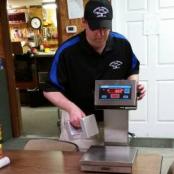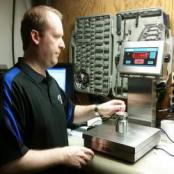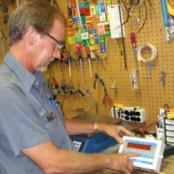Use up and down arrows to select available result. Press enter to go to selected search result. Touch devices users can use touch and swipe gestures.
We sell, repair, calibrate & rent scales
Calibration of a scale is a procedure in which a licensed scale technician uses a known calibration weight certified by the State of North Carolina Bureau of Weights and Measures, to test and adjust the response of a mechanical or electronic weighing system to the following tests; The display indicator must show zero when there is no weight on scale. When a known weight is applied the indicator must display the exact amount of applied weight within a specific tolerance. When weight is applied or removed incrementally the scale must display the weight equal to that on the scale within the specified tolerance mentioned above. The increasing load test and decreasing load test along with corner testing would be ideal in many situations.
We are sometimes asked how to test or check accuracy or how often to perform scale calibration and the answers can vary depending on your situation. To check the scale you simply put an item on the scale and see what it weighs. Ideally this would be a certified test weight. Another example might be if you own a portable truck scale, you should probably calibrate that scale every time you move it from one location to another location. Or at least check it with a known weight to make sure the accuracy is still acceptable.
Historically, a calibration has been defined as a process of comparing and recording indicated values obtained from a measuring instrument with the corresponding values obtained when using measurement standards. For example, when calibrating a bench scale, the indicated value from viewing the scale display can be compared with the value of the test weight. This can be done over a range of weights, and a calibration table can be developed that records indicated values from the scale and corresponding values obtained from the different test weights used.
Scale calibration of a scale is a procedure in which a certified scale technician uses known weight certified by the State of North Carolina Bureau of Weights and Measures, to adjust the response of a mechanical or electronic weighing system to the following tests; The indicator must show zero when there is no weight on scale. When a known weight is applied the indicator must display the exact amount of applied weight. When weight is applied or removed incrementally the scale must display weight equal to that on the scale display.
All scales ideally need to be calibrated when first placed into service to insure accurate operation. Any scale will drift away from its original calibration in time. Wear of mechanical components, age and degree of use, all contribute to calibration drift. Many states require that any scale used to buy or sell based on weight must be NTEP approved and inspected and certified as to it’s accuracy.
 CalibrationWe have been checking, testing, adjusting, and calibrating scales since way back in 1980. Our scale technicians are certified and factory trained. And, we use certified test weights for accurate results.
CalibrationWe have been checking, testing, adjusting, and calibrating scales since way back in 1980. Our scale technicians are certified and factory trained. And, we use certified test weights for accurate results. Calibration TolerancesWe have been checking, testing, adjusting, and calibrating scales since way back in 1980. In general, industrial scales are accurate to 0.1 of 1 percent of the test load.
Calibration TolerancesWe have been checking, testing, adjusting, and calibrating scales since way back in 1980. In general, industrial scales are accurate to 0.1 of 1 percent of the test load. Scale Repair ServiceScale Service and Repairs is what we do. If your Digital balance or scale breaks we can fix it. When your scale needs calibrated,we can handle that promptly & efficiently with NIST traceable standards & documentation.
Scale Repair ServiceScale Service and Repairs is what we do. If your Digital balance or scale breaks we can fix it. When your scale needs calibrated,we can handle that promptly & efficiently with NIST traceable standards & documentation.
What is scale calibration?
Calibration of a scale is a procedure in which a certified scale technician uses known weight certified by the State of North Carolina Bureau of Weights and Measures, to adjust the response of a mechanical or electronic weighing system to the following tests; The indicator must show zero when there is no weight on scale. When a known weight is applied the indicator must display the exact amount of applied weight. When weight is applied or removed incrementally the scale must display weight equal to that on the scale display.
Why is calibration needed?
All scales ideally need to be calibrated when first placed into service to insure accurate operation. Any scale will drift away from its original calibration in time. Wear of mechanical components, age and degree of use, all contribute to calibration drift. Many states require that any scale used to buy/sell based on weight must be NTEP approved and inspected and certified as to it’s accuracy. Normally, we recommend calibration every quarter by a trained scale technician with certified test weights.
Top of this page
How often must I calibrate?
There are several factors to consider when deciding on frequency of scale calibration testing. Is the scale operating in a hostile environment? How much is this equipment being used, one two, three shifts, or only several times a week? Are there Quality Control parameters which must be maintained such as ISO 9000? How long can your company afford to allow your scale equipment to operate with a possible error in the weight reading(s)? After factoring all the information above, many customer's feel calibration service once a quarter is ideal.
Top of this page
How can I set up my weighing equipment for regular calibration?
Central Carolina Scale, Inc. will assist in setting up your custom scale service agreement program by taking into consideration all of the above questions. It is recommended that scales be calibrated either monthly, quarterly, or twice a year.... depending on accuracy required, scale usage, and manufacturer recommendations. Central Carolina Scale, Inc. will perform the tests as prescribed in the service agreement statement.
Top of this page
Calibration & Test Procedures
Cleaning
Platform: The scale deck should be wiped free of foreign materials and checked for obstructions. Check under and around the platform for foreign materials. Remove any items that will adversely effect weighing accuracy. Pit type scales should be checked for clearance around the pit walls and foreign materials removed if necessary. Mechanical scales should be checked for freedom of movement in all directions.
Top of this page
Inspection
Marking: All scales should be properly marked with the capacity and count by on the display panel or the serial tag. "NTEP Legal for trade" scales must be properly marked in accordance with Handbook 44 requirements with a CoC number.
Over Load Stops: Visually inspect the over load stops for proper clearance. Small bench scales should be loaded to capacity to determine if the stops have sufficient clearance and with capacity weights on the scale, gently push the platform to insure that the stops are engaged with very little movement required.
Top of this page
Testing
Overview: Test procedures according to CCS, Inc. will be adhered to, unless other test procedures are requested by the customer. All tests should be completed and the initial error properly marked before corrections are started.
For calibration information or to schedule a service calibration routine for your scales or lab balances, please give the service team at Central Carolina Scale a call today at (919) 776-7737
